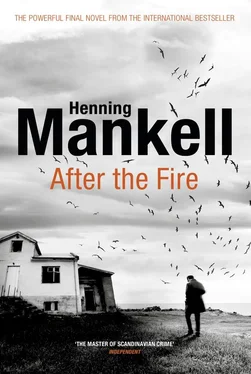I told her what had happened, giving dates and times, from Louise’s initial phone call to my arrival in Paris, and the fact that I hadn’t managed to contact her. I also explained that we hadn’t known about one another until Louise was an adult, and that I had only recently realised that she probably made her living as a pickpocket. At least sometimes. Hopefully not all the time.
I could see from Petra’s name badge that her surname was Munter, but it didn’t give a title. She took notes while I was talking, occasionally raising her hand to stop me until she had caught up.
‘This can’t be the first time a parent has turned up at the embassy, worried because their child has disappeared or ended up in prison,’ I said. ‘You must know what I ought to do.’
‘First of all we need to find out where she is. We have official channels.’
‘So you’re responsible for what the receptionist referred to as my “business”?’
‘I’m a trainee,’ Petra said. ‘I’m at the bottom of the heap. But I’m the one who kicks this upstairs or makes the decision not to pursue the matter.’
‘And you’re going to kick it upstairs?’
‘I think what you’ve told me is perfectly true.’
‘I’m worried about my daughter.’
She made a note of my mobile number and the name of my hotel.
‘We should know more tomorrow,’ she said, rising to her feet to indicate that the meeting was over.
‘My daughter is pregnant,’ I said again. ‘She was scared when she called me.’
Petra Munter gazed at me for a long time. She suddenly seemed to have grown up, no longer the teenager I had seen when she walked into reception.
‘I’ll make sure something is done, but the French don’t like foreign thieves operating here. They don’t exactly get a slapped wrist.’
‘So what do they get?’
She pulled a face but didn’t answer. I pictured Louise sitting in the same cellar where I had once spent the night.
Petra walked me to the door and I shook her hand.
‘Someone will contact you tomorrow,’ she said. ‘You have my word.’
As she walked away, I remembered something else.
‘I need a passport,’ I said. ‘A few weeks ago my house burned down. Everything was destroyed. I travelled here on a provisional passport, but I’d feel better if I had a proper one.’
‘We have an excellent machine here,’ she said. ‘It produces a Swedish passport within a very short time. But you could just as easily wait until you get back home.’
I left the embassy, making a mental note of the opening hours, and set off back to Montparnasse.
My mobile rang. There was a lot of traffic, so I hurried into a side street before I answered. It was a Swedish number that I didn’t immediately recognise.
It was Jansson.
‘I noticed you weren’t at home,’ he yelled.
Jansson always yells down the phone. He has never been able to accept that distance is irrelevant when he makes a call or when someone calls him. I remembered old fru Hultin, who lived on Vesselskär for a long time after she was widowed. I used to help her out with her bad feet now and again.
‘Jansson screams like a jay,’ she would say whenever he came up in the conversation. She herself spoke so quietly on the phone that it was hard to make out what she was saying. She probably thought that everyone in the archipelago was sitting by their phone, listening to the latest gossip about her corns.
‘How do you know I’m not at home?’
‘I happened to be passing. The police have been looking for you.’
‘They haven’t phoned me.’
‘They came by boat. Something to do with the fire.’
‘Have I been charged?’
‘I don’t know anything about that.’
‘So what did they say?’
‘They just asked if I knew where you were.’
‘But you didn’t?’
‘No.’
‘I left a note for Alexandersson before I left. He knows I’m away.’
‘So I don’t need to worry?’
‘Why would you worry? Was it you who set fire to my house?’
‘Why would you say such a thing?’
‘I’m in Paris.’
‘What the hell are you doing there?’
Jansson rarely swears. Just as he rarely uses his beautiful singing voice.
‘I’m the one who’s looking for the police, rather than the other way round.’
‘I haven’t a clue what you’re talking about.’
‘It seems as if Louise has got into some difficulties, but I’d rather you didn’t spread that throughout the archipelago.’
‘I would never do such a thing.’
‘Both you and I know that you would. During all those years when you were a postman you spread just as many rumours as letters.’ Jansson said nothing, but I knew he was offended. ‘The police must have said something else,’ I went on.
‘They asked me to let them know when you came back.’
‘And of course you said you would?’
‘What else was I supposed to say?’
‘Has there been anything in the newspaper?’
‘No.’
I wondered what I should ask Jansson to do; I didn’t want anyone thinking I had fled from my homeland.
‘So you’re really in Paris?’
‘My battery’s running out; you’re breaking up.’
It wasn’t true, but Jansson would carry on trying to draw the story out of me unless I ended the call right now.
‘Talk to you later,’ I said and hung up.
I was sweating. The fact that the police were looking for me could only mean they were convinced I was guilty. I hated sympathy, particularly when it was offered by people as stupid as Jansson. Only I have the right to feel sorry for myself.
I strolled along Boul’Mich and stopped at the bistro where Jean-Paul Sartre and Simone de Beauvoir used to spend their days. There were lots of people inside, so I sat down at one of the pavement tables. I had a coffee and two glasses of Calvados. My trip to Paris was beginning to resemble an alcohol-sodden escape from my isolated island, where the ruins of my burned-out house lay waiting for the winter snow.
I tried to think through what would happen when I found Louise. I didn’t even know what she was accused of.
I couldn’t focus. I headed back to the hotel, my pace getting slower and slower. When I glanced at the shop windows, I saw an old man’s face looking back at me. A lady by the name of Madame Rosini was on duty instead of Monsieur Pierre, and gave me my key. They were very much alike, somehow: the same faint smile, the same warmth. There was no sign of Rachel.
I lay down on the bed and fell asleep. In my dream the house was burning down once more. I ran outside to escape the blinding light, only to be transported straight back to my bed. Over and over again the darkness metamorphosed into dazzling searchlights, searing my eyeballs. My dog, who died several years ago, came back to life. I also thought I saw my last cat, running away with her fur on fire.
It was dark when I woke up. I got undressed and had a shower. The water was just as cold as the sea; I couldn’t work out how to adjust the taps.
I had just wound the biggest towel around my waist when my phone rang — a Swedish number again. I hesitated; should I answer? Was it Jansson or someone from the police?
It was Lisa Modin.
‘What’s the hotel like?’ she asked.
‘Is that why you’re calling?’
‘I’m going to come over.’
‘Today?’
‘Tomorrow. Don’t ask me why.’
‘I’m really pleased.’
‘Don’t expect anything.’
‘Why do you always say that?’
‘I just want to make sure you’re not expecting anything.’
‘When are you arriving?’
‘I don’t know.’
‘I’ll come and meet you.’
‘I don’t want you to do that. Have you found your daughter?’
Читать дальше












